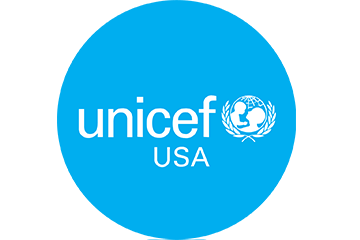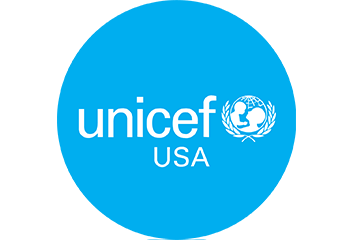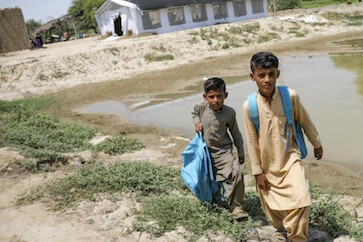As a result of the worst shock to education and learning in recorded history, learning poverty has sharply increased in low- and middle-income countries, with nearly two-thirds of 10-year-olds unable to understand a simple written text, according to a new report compiled by UNICEF, other UN agencies and other partners.
The State of Global Learning Poverty: 2022 Update, a joint publication of the World Bank, UNICEF, the UK government’s Foreign, Commonwealth & Development Office, The U.S. Agency for International Development (USAID) and the Bill & Melinda Gates Foundation, released in partnership with UNESCO, stresses that even before the pandemic, there was already a learning crisis, and that COVID-driven school disruptions have only made things worse.
On March 6, 2022 in Mosul, Iraq, students line up to return to class at the UNICEF-supported Al-Hamideen School. © UNICEF/UN0613722/Ibarra Sánchez
Vulnerable children are affected the most. Children in low-income countries are around seven times less likely to reach minimum reading proficiency by age 10 than children of the same age in high-income countries. Learning deficits are a major driver of intergenerational poverty and inequality.
As leaders gather in Paris this week for a Transforming Education Pre-Summit, UNICEF is renewing its call for urgent action to avert a generational catastrophe.
Learning poverty puts $21 trillion in potential lifetime earnings at risk
The learning crisis is widely viewed as a threat to the future and well-being of an entire generation of children — as well as to global and national development, growth and prosperity — with an estimated $21 trillion in potential lifetime earnings at risk.
A student, Paula, raises her hand during class at UNICEF-supported Yosiba Elementary School in Simporo, Papua Province, Indonesia, on June 15, 2021. © UNICEF/UN0506301/Ijazah
There is good news, however. Evidence shows that it will take as little as $10 to $15 per child to deliver remedial education and strengthen existing education systems’ ability to deliver on foundational skills, according to the report.
UNICEF’s “R.A.P.I.D.” framework for addressing the global learning crisis recommends that governments:
- Reach and Retain every child in school
- Assess learning levels
- Prioritize teaching the fundamentals
- Increase catch-up learning and progress beyond what was lost
- Develop psychosocial health and well-being so every child is ready to learn
It is not enough simply to reopen schools. Children, especially the most marginalized, need support to catch up and progress and to ensure their continued ability to learn.
In a previous study of education recovery efforts released in March, UNICEF reported that less than half of countries surveyed were implementing learning recovery strategies at scale to help children catch up on what they’ve missed; that only half of low-income countries had a plan in place to assess where those who have returned are at in their learning; and that the share for education had declined during the pandemic in both the official development assistance and humanitarian aid.
Sundus Moleameed Alimed, left, teaches 3- and 4-year-old pre-primary school students how to count to 10 in Arabic through a song they sing back to her. The children are benefiting from a UNICEF-supported community education program in Puntland state, Somalia. © UNICEF/UN0635371/Hill
In its call to action, UNICEF is urging partners and policy makers to close the gap in investment in foundational learning, with a focus on the most marginalized children and communities.
Ensuring foundational literacy and math skills are critical for learning recovery
Ensuring that every student gains a solid foundation in basic reading and mathematics is the key skills children need to build their futures, and those of their families and communities. Without these basic skills, students are unable to recover lost learning, are not prepared to transition to secondary education and, ultimately, will struggle to find success in the workplace. In accounting, assessing, and accelerating learning, UNICEF advocates that governments take a back-to-the-basics approach and ensure a sharp focus on basic reading and mathematics.
Learn more about learning poverty and UNICEF’s strategies for addressing it. Read the report.
Help UNICEF tackle the global learning crisis head on — and help create a world where every child has equal access to quality education. Donate today.
Top photo: Children attending class at a UNICEF-supported school in Mbandaka, in the Equatorial Provence of the Democratic Republic of the Congo. © UNICEF/UN0507549/Dejongh





